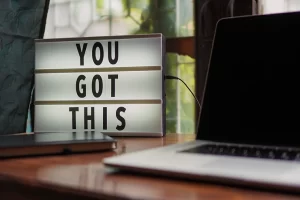Photo by Nathan Cowley from Pexels
New beginnings are associated with new expectations and new hopes. They often uplift us and give us a promise of positive change. Many of us view the start of a new year as a new cycle of life that brings potential for a brighter tomorrow. In fact, this time of year is so powerful that it inspires many of us to make resolutions for change. Of course, once the moment of inspiration passes and daily reality sets in, our commitment to the change often dissipates as well, and we find ourselves breaking the New Year’s resolutions we set just a few months or even weeks ago.
Anxiety
Anxiety is fearful anticipation of a potential outcome. It sends your body into a fight or flight response based on the perceived potential danger. In any fight or flight situation, blood rushes away from the brain and to the extremities so that we can successfully fight with our fists or run with our legs. This redistribution of blood means that we stop thinking rationally or clearly and allow our body to handle the situation for us.
Panic attacks
A panic attack, anxiety’s bigger cousin, is often triggered by something traumatic. However, we often create an emotional association with the events, sounds, or sights that accompany the initial attack, and those begin to trigger further negative responses quite independently of the original trauma. For example, a man loses a loved one and puts aside the painful emotions as much as possible. Sometime later, while driving on a highway, he comes across a car accident on the side of the road. The flashing lights and sounds surrounding the accident bring back the flashes and noises of the hospital where his loved one died, and this brings up the suppressed emotions of sadness, fear, panic, loss, loneliness, etc. that he was experiencing at that time. As the emotions flood back, he becomes overwhelmed and experiences the first panic attack. His brain associates the feelings of the moment with the surroundings – the highway, and seemingly inexplicably, from then on any time he gets on a highway, he experiences a panic attack.
Fears and phobias
Fear is usually a reaction to a trigger that reminds us of a negative past event. For example, a big dog ran up to you when you were little. This scared you, and now, every time you see a big dog, you experience the same fearful reaction. A phobia is a fear that has no immediately-available explanation in your past. For example, you are afraid of birds, yet no bird has ever actually done anything to you. The explanations are usually there, but they may lie outside of the timeline of this life.
Anger
Anger is a reaction that usually covers up much deeper emotions, such as deep sadness, powerlessness, low self-esteem, fear, etc. Anger usually bursts forth because we feel ill-equipped to handle the situation differently.
Depression
When facing real or perceived danger, instead of fighting or fleeing, we may sometimes freeze. This reaction is expressed as sadness and even depression, a reaction that prevents us from engaging in any action.
I know that however you react to life, you are doing the best you can with the knowledge and tools you have. But if you are experiencing any of the emotional responses listed here, they are likely holding you back from living a full and joyful life and probably demonstrated that you have some unresolved emotional trauma. And if that is the case, how about turning a new leaf and letting go of these blocks in the new year?




